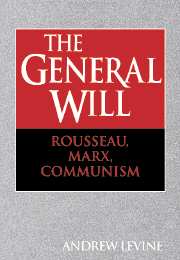Book contents
- Frontmatter
- Contents
- Preface
- Introduction
- Chapter 1 The general will in theory
- Chapter 2 The “origin” of the private will
- Chapter 3 Solidarity
- Chapter 4 Democracy in the Age of States
- Chapter 5 The last state
- Chapter 6 The liberal state and/versus the last state
- Chapter 7 Rousseauean Marxism and/versus liberalism
- Chapter 8 Communism
- Chapter 9 After Communism, communism?
- Index of names
Chapter 7 - Rousseauean Marxism and/versus liberalism
Published online by Cambridge University Press: 10 December 2009
- Frontmatter
- Contents
- Preface
- Introduction
- Chapter 1 The general will in theory
- Chapter 2 The “origin” of the private will
- Chapter 3 Solidarity
- Chapter 4 Democracy in the Age of States
- Chapter 5 The last state
- Chapter 6 The liberal state and/versus the last state
- Chapter 7 Rousseauean Marxism and/versus liberalism
- Chapter 8 Communism
- Chapter 9 After Communism, communism?
- Index of names
Summary
Marxist theory is based in large part on the writings Karl Marx produced from the early 1840s until his death in 1883. But Marxism did not become a discernible tendency until around the time of the Paris Commune (1871) and was not a fully consolidated current within the workers' movement until after Marx's death. In contrast, the origins of modern liberalism can be traced back at least to pleas for religious toleration occasioned by the Protestant Reformation and to theories of limited government that arose almost concurrently with the nation-state itself. By the mid-eighteenth century, more than a hundred years before Marxism's classical period, liberalism was a self-conscious intellectual and political tendency.
It is therefore only within the past century that Marxism and liberalism have stood as ostensibly rival positions. However, it might appear misleading to describe them as opposed, for throughout the past hundred years most Marxists have maintained that Marxism spurns the very idea of normative theory. If Marxists have principled reasons for assuming this posture, then, strictly speaking, there would be no Marxist normative theory to rival liberal claims. But at the same time that Marxists have disavowed normative theory in general – and moral discourse in particular – they have also evinced an inclination, evident in Marx's own writings and in the work of nearly all Marxists after him, to render moral judgments. They have also insisted that normative discourse is ideological and therefore “superstructural,” constrained, though not strictly determined, by the “economic base” of the societies that produce and reproduce it.
- Type
- Chapter
- Information
- The General WillRousseau, Marx, Communism, pp. 147 - 167Publisher: Cambridge University PressPrint publication year: 1993
- 1
- Cited by



